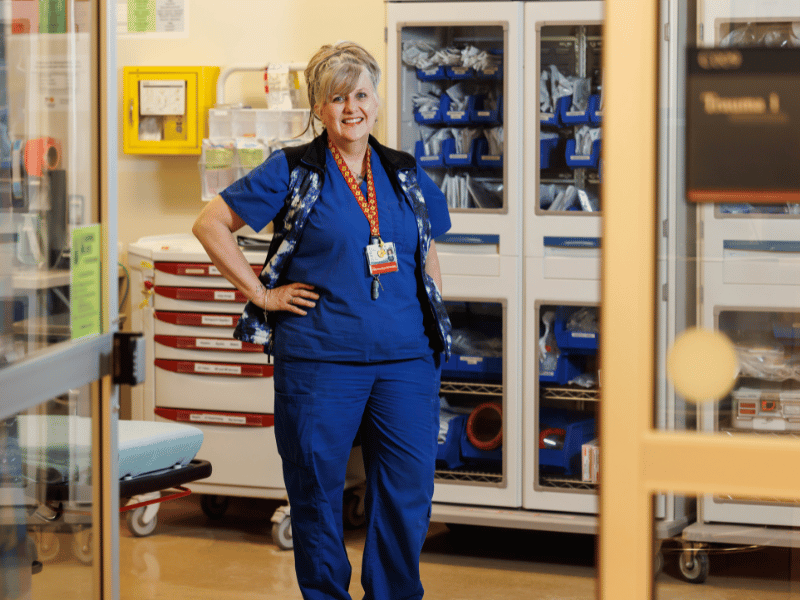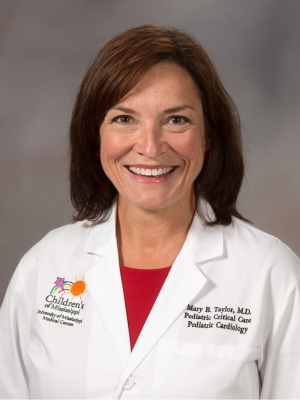Front and Center: Dr. Kerry Yancy

Dr. Kerry Yancy, assistant professor of pediatric emergency medicine at the University of Mississippi Medical Center, is one of only four physicians in the nation to be certified in 2023 by the American Board of Disaster Medicine. She is the first and only doctor in the state to hold the designation.
While caring for children as an attending physician in the pediatric emergency department at UMMC’s pediatric arm, Children’s of Mississippi, Yancy earned a master’s degree with an emphasis in emergency management from the University of Mississippi in 2022.
Her tests continue, though. One such test was March 24, 2023, the night an EF4 tornado ripped through Rolling Fork and Silver City, killing 17 and injuring 165. Her experience that night and her master’s degree in emergency management led to her earning the disaster medicine certification.
Dr. Mary Taylor, Suzan B. Thames Chair and professor of pediatrics, said the benefit of Yancy’s additional training and certification makes the pediatric emergency department, a Level I trauma center, better prepared to respond.

“Children’s of Mississippi provides the highest level of pediatric care to the state’s children,” she said. “Dr. Yancy’s expertise in disaster medicine is one of the ways Children’s of Mississippi is a uniquely skilled resource for Mississippians.”
When word reached UMMC of the tornado, Yancy turned her training into action. She had certification in basic and advanced disaster life support through Emergency Services at UMMC and had been in the inaugural class of a master of science degree in criminal justice with emphasis in homeland security and emergency management program from Ole Miss. The master’s hours were paid for as an employee benefit.
After hearing of the tornado through Mississippi MED-COM, Yancy and the pediatric emergency department team went to work, making room for incoming patients by moving patients to be admitted upstairs in the hospital’s Batson Tower and treating those who could go home.
“We wanted to have the maximum capacity for incoming patients,” she said. “We wanted to be ready for a surge.”
When the first patient from Rolling Fork arrived, 11 of the 20 rooms in the pediatric emergency department were open.
The team had already made sure extra supplies and oxygen tanks were at the ready. Nurses and physicians volunteered to stay after their shifts were over or to come in if they were off. Physicians divided their duties, with some caring for Rolling Fork patients and others treating other injuries or illnesses.
“Everything we did that night was part of that master’s training,” she said. “All of this was what we were taught to do.”
Five Rolling Fork children were treated for injuries that night, but UMMC was prepared for more.
To learn from the experience, those on duty held a debriefing, discussing what went well and opportunities for improvement.
“We were talking about how to go from an A- to an A+,” Yancy said. “We did all the right things in preparation but could have improved communication between our team and consulting physicians who were also serving adult patients.”
Another part of her training put her focus on the emergency workers who were traveling from the Delta with patients.
“In emergency care, we are often in the moment and forget to drink water or eat something,” she said. “The emergency response workers were seeing the worst of the storm’s destruction and were burning through calories. We grabbed sports drinks and snacks and sent those back with them as they returned to Rolling Fork so they would have something to eat.”
That night, she said, “I was directly able to use the skills I learned to successfully and efficiently oversee our response to the injured children who arrived for care. I have no doubt that the night would have been more chaotic had I not been so well trained. This was only possible because of the generous tuition benefit from Ole Miss.”
Another facet of her master’s degree – homeland security – has honed her focus on human trafficking. She’s shared her knowledge of the signs of human trafficking, the subject of her capstone project, with her colleagues.
“More than 80 percent of the victims of human trafficking come in contact with health care facilities,” she said, “so there’s a great opportunity for us as health care providers to watch for signs that a patient may be a victim of sex trafficking or labor trafficking. We have now identified several victims and initiated assistance.”
Residents at UMMC are taught to look for signs of human trafficking, which can range from bruises to untreated infections.
Yancy may have finished her master’s degree, but she is still taking classes from Ole Miss. Her latest classes are in undergraduate Spanish, and like her training in emergency management, the credit hours were paid for.
“I encourage our residents and fellow faculty members to continue learning,” she said. “The opportunities to continue to learn are great here.”


